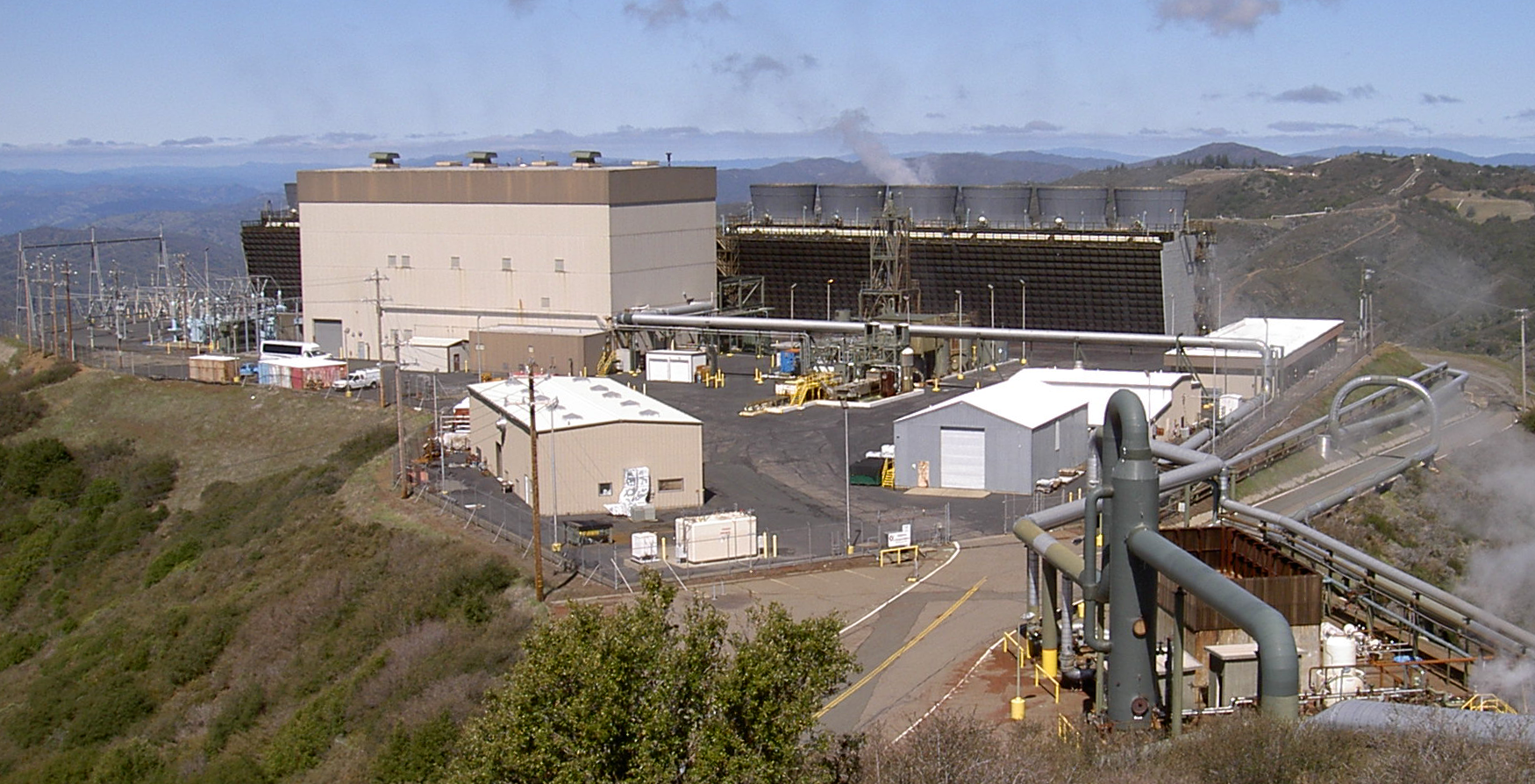|
Geothermal Power Plant
Geothermal power is electrical power generated from geothermal energy. Technologies in use include dry steam power stations, flash steam power stations and binary cycle power stations. Geothermal electricity generation is currently used in 26 countries,Geothermal Energy AssociationGeothermal Energy: International Market Update May 2010, p. 4-6. while geothermal heating is in use in 70 countries. As of 2019, worldwide geothermal power capacity amounts to 15.4 gigawatts (GW), of which 23.9 percent or 3.68 GW are installed in the United States. International markets grew at an average annual rate of 5 percent over the three years to 2015, and global geothermal power capacity is expected to reach 14.5–17.6 GW by 2020. Based on current geologic knowledge and technology the Geothermal Energy Association (GEA) publicly discloses, the GEA estimates that only 6.9 percent of total global potential has been tapped so far, while the IPCC reported geothermal power potential to be in ... [...More Info...] [...Related Items...] OR: [Wikipedia] [Google] [Baidu] |
Geothermal Energy In The United States
Geothermal energy was first used for electric power production in the United States in 1960. The Geysers in Sonoma and Lake counties, California was developed into the largest geothermal steam electrical plant in the world, at 1,517 megawatts. Other geothermal steam fields operate in the western US and Alaska. Geothermal power can be dispatchable to follow the demands of changing loads. Its environmental impact includes hydrogen sulfide emissions, corrosive or saline chemicals discharged in waste water, possible seismic effects from injection into rock formations, waste heat and noise. History Archaeological evidence documents that geothermal resources have been in use in the US for more than 10,000 years. Paleo-Indians first used geothermal hot springs for warmth, cleansing, and minerals. Pacific Gas and Electric opened the US' first commercial geothermal power plant at The Geysers in California in September 1960, initially producing eleven megawatts of net power. The ... [...More Info...] [...Related Items...] OR: [Wikipedia] [Google] [Baidu] |
Krafla Geothermal Power Station
The Krafla geothermal power plant ( is, Kröflustöð ) is a geothermal power generating facility located in Iceland, close to the Krafla Volcano and the lake Mývatn. With 33 boreholes, it is considered to be Iceland's largest power station and it is able to produce 500 GWh of electricity annually, with an installed capacity of 60 megawatts. The construction work started in 1974, but due to volcanic activities in the area, building was slowed. The Krafla power station was officially launched in the early 1977, but was only able to produce at its full 60-megawatt capacity after a second steam turbine was installed in 1996. Originally the power plant was owned by the government, but was purchased in 1985 and has since been operated by Landsvirkjun (National Power Company). About 15 employees work there full-time. Geothermal power station details The Krafla geothermal power plant consists of two 30-megawatt units, with double pressure inlet and dual-flow turbines with 5 steps on ... [...More Info...] [...Related Items...] OR: [Wikipedia] [Google] [Baidu] |
Renewable Energy
Renewable energy is energy that is collected from renewable resources that are naturally replenished on a human timescale. It includes sources such as sunlight, wind, the movement of water, and geothermal heat. Although most renewable energy sources are sustainable, some are not. For example, some biomass sources are considered unsustainable at current rates of exploitation. Renewable energy often provides energy for electricity generation to a grid, air and water heating/cooling, and stand-alone power systems. Renewable energy technology projects are typically large-scale, but they are also suited to rural and remote areas and developing countries, where energy is often crucial in human development. Renewable energy is often deployed together with further electrification, which has several benefits: electricity can move heat or objects efficiently, and is clean at the point of consumption. In addition, electrification with renewable energy is more efficient and therefore ... [...More Info...] [...Related Items...] OR: [Wikipedia] [Google] [Baidu] |
Megawatt
The watt (symbol: W) is the unit of Power (physics), power or radiant flux in the International System of Units, International System of Units (SI), equal to 1 joule per second or 1 kg⋅m2⋅s−3. It is used to quantification (science), quantify the rate of Energy transformation, energy transfer. The watt is named after James Watt (1736–1819), an 18th-century Scottish people, Scottish invention, inventor, mechanical engineer, and chemist who improved the Newcomen steam engine, Newcomen engine with his own Watt steam engine, steam engine in 1776. Watt's invention was fundamental for the Industrial Revolution. Overview When an object's velocity is held constant at one metre per second against a constant opposing force of one Newton (unit), newton, the rate at which Work (physics), work is done is one watt. : \mathrm In terms of electromagnetism, one watt is the rate at which electrical work is performed when a current of one ampere (A) flows across an electrical potentia ... [...More Info...] [...Related Items...] OR: [Wikipedia] [Google] [Baidu] |
Pacific Gas And Electric
The Pacific Gas and Electric Company (PG&E) is an American investor-owned utility (IOU). The company is headquartered in the Pacific Gas & Electric Building, in San Francisco, California. PG&E provides natural gas and electricity to 5.2 million households in the northern two-thirds of California, from Bakersfield and northern Santa Barbara County, almost to the Oregon and Nevada state lines. Overseen by the California Public Utilities Commission, PG&E is the leading subsidiary of the holding company PG&E Corporation, which has a market capitalization of $3.242 billion as of January 16, 2019. PG&E was established on October 10, 1905 from the merger and consolidation of predecessor utility companies, and by 1984 was the United States' "largest electric utility business". PG&E is one of six regulated, investor-owned electric utilities (IOUs) in California; the other five are PacifiCorp, Southern California Edison, San Diego Gas & Electric, Bear Valley Electric, and Liberty Utilit ... [...More Info...] [...Related Items...] OR: [Wikipedia] [Google] [Baidu] |
Subsidence
Subsidence is a general term for downward vertical movement of the Earth's surface, which can be caused by both natural processes and human activities. Subsidence involves little or no horizontal movement, which distinguishes it from slope movement. Processes that lead to subsidence include dissolution of underlying carbonate rock by groundwater; gradual compaction of sediments; withdrawal of fluid lava from beneath a solidified crust of rock; mining; pumping of subsurface fluids, such as groundwater or petroleum; or warping of the Earth's crust by tectonic forces. Subsidence resulting from tectonic deformation of the crust is known as tectonic subsidence and can create accommodation for sediments to accumulate and eventually lithify into sedimentary rock. Ground subsidence is of global concern to geologists, geotechnical engineers, surveyors, engineers, urban planners, landowners, and the public in general.National Research Council, 1991. ''Mitigating losses from land subsi ... [...More Info...] [...Related Items...] OR: [Wikipedia] [Google] [Baidu] |
Wairakei Power Station
The Wairakei Power Station is a geothermal power station near the Wairakei Geothermal Field in New Zealand. Wairakei lies in the Taupo Volcanic Zone. History The power station was built in 1958, the first of its type (wet steam) in the world, and it is currently owned and operated by Contact Energy. A binary cycle power plant was constructed in 2005 to use lower-temperature steam that had already gone through the main plant. This increased the total capacity of the power station to 181MW. The Wairakei power station is due to be phased out from 2013, replaced by the Te Mihi geothermal power station. The Poihipi Power Station was built in 1996 at a nearby site in the same field. Units Wairakei A station * Unit 1 – 11.2 MW intermediate pressure * Unit 4 – 11.2 MW intermediate pressure * Unit 7 – 11.2 MW low pressure * Unit 8 – 11.2 MW low pressure * Unit 9 – 11.2 MW low pressure * Unit 10 – 11.2 MW low pressure Units 2, 3, 5 and 6 were ... [...More Info...] [...Related Items...] OR: [Wikipedia] [Google] [Baidu] |
Top 5 Geothermal-Electric Countries
A spinning top, or simply a top, is a toy with a squat body and a sharp point at the bottom, designed to be spun on its vertical axis, balancing on the tip due to the gyroscopic effect. Once set in motion, a top will usually wobble for a few seconds, spin upright for a while, then start to wobble again with increasing amplitude as it loses energy, and finally tip over and roll on its side. Tops exist in many variations and materials, chiefly wood, metal, and plastic, often with a metal tip. They may be set in motion by twirling a handle with the fingers, by pulling a rope coiled around the body, or by means of a built-in auger (spiral plunger). Such toys have been used since antiquity in solitary or competitive games, where each player tries to keep one's top spinning for as long as possible, or achieve some other goal. Some tops have faceted bodies with symbols or inscriptions, and are used like dice to inject randomness into games, or for divination and ritual purposes. The ... [...More Info...] [...Related Items...] OR: [Wikipedia] [Google] [Baidu] |
The Geysers
The Geysers is the world's largest geothermal field, containing a complex of 18 geothermal power plants, drawing steam from more than 350 wells, located in the Mayacamas Mountains approximately north of San Francisco, California. Geysers produced about 20% of California's renewable energy in 2019. History For about 12,000 years, Native American tribes built steambaths and thermal pools at the Geysers and used the steam and hot water for healing purposes, as well as spiritual and ceremonial practices, and cooking. The thermal pools were used as a medicinal treatment for rheumatism and arthritis. While the heated muds were used to soothe skin rashes and other aches and pains, using the fumaroles as a natural energy source. When European Americans first entered the area, six Indian tribes inhabited the area around the Geysers, three bands of Pomo people, two bands of Wappo people, and the Lake Miwok people. The Wappo also collected sulfur which they called ''te'ke'' and a Wappo vi ... [...More Info...] [...Related Items...] OR: [Wikipedia] [Google] [Baidu] |
Beppu
is a city in Ōita Prefecture on the island of Kyushu, Japan. As of March 31, 2017, the city had a population of 122,643"Statistics: Population" Beppu City Government website . Accessed 21 April 2017. and a of . The total area is . Beppu is famous for its hot springs. Geography Beppu is situated at the west end of , around the east central prefecture. The north, west, and east of the city are the mountains or highlands with elevations of several hundreds meters above sea level. Most of those mountains are the fourth-peri ...[...More Info...] [...Related Items...] OR: [Wikipedia] [Google] [Baidu] |
Larderello
Larderello is a ''frazione'' of the ''comune'' of Pomarance, in Tuscany in central Italy, renowned for its geothermal productivity. Geography The region of Lardarello has experienced occasional phreatic eruptions, caused by explosive outbursts of steam trapped below the surface. The water is contained in metamorphic rocks where it is turned to steam which is then trapped beneath a dome of impermeable shales and clay. The steam escapes through faults in the dome and forces its way out in the hot springs. It possesses a dozen explosion craters 30–250 m in diameter. The largest is the Lago Vecchienna crater which last erupted around 1282, now filled by the Boracifero Lake. Larderello now produces 10% of the world's entire supply of geothermal electricity, amounting to 4,800 GWh per year and powering about a million Italian households. Its geology makes it uniquely conducive to geothermal power production, with hot granite rocks lying unusually close to the surface, produc ... [...More Info...] [...Related Items...] OR: [Wikipedia] [Google] [Baidu] |





